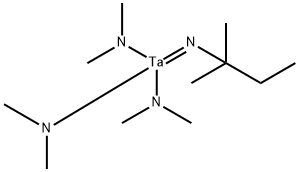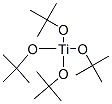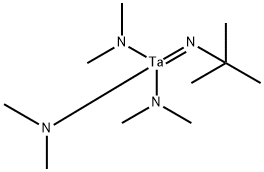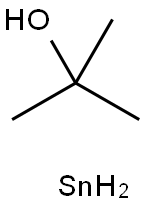CHLOROTITANIUM TRIISOPROPOXIDE
Synonym(s):Chlorotitanium(IV) triisopropoxide;Titanium(IV) chloride triisopropoxide
- CAS NO.:20717-86-6
- Empirical Formula: C9H21ClO3Ti
- Molecular Weight: 260.58
- MDL number: MFCD00009861
- EINECS: 679-414-4
- SAFETY DATA SHEET (SDS)
- Update Date: 2025-09-25 17:15:13

What is CHLOROTITANIUM TRIISOPROPOXIDE?
Chemical properties
Colorless to yellow liquid or low melting solid,
The Uses of CHLOROTITANIUM TRIISOPROPOXIDE
Chlorotriisopropoxytitanium(IV) solution may be used as a precursor for the synthesis of ultralow density ceramic materials. The product may be used to mediate a reductive amination reaction of 5α-cholestane-3,7-dione to yield aryl aminocholestanes.
What are the applications of Application
Chlorotriisopropoxytitanium(IV) is a useful additive for increased regio- and stereocontrol in aldol reactions
Purification Methods
When distilled under vacuum, the distillate sets slowly to a solid on standing. Stock reagents are made by dissolving the warm liquid in pentane, toluene, Et2O, THF, CH2Cl2,, and can be stored in a pure state or in solution under dry N2 for several months. The reagent is hygroscopic and is hydrolysed by H2O. [Reetz et al. Chem Ber 118 1421 1985.]
Properties of CHLOROTITANIUM TRIISOPROPOXIDE
| Melting point: | 35-40 °C |
| Boiling point: | 63-66°C 0,1mm |
| Density | 1.091 g/mL at 25 °C (lit.) |
| Flash point: | 72 °F |
| storage temp. | Flammables area |
| form | liquid |
| color | fused solid to pale yellow |
| Specific Gravity | 1.091 |
| Hydrolytic Sensitivity | 7: reacts slowly with moisture/water |
| Sensitive | Moisture Sensitive |
| BRN | 4163222 |
| CAS DataBase Reference | 20717-86-6(CAS DataBase Reference) |
| EPA Substance Registry System | Titanium, chlorotris(2-propanolato)-, (T-4)- (20717-86-6) |
Safety information for CHLOROTITANIUM TRIISOPROPOXIDE
| Signal word | Danger |
| Pictogram(s) |
 Flame Flammables GHS02  Corrosion Corrosives GHS05 |
| GHS Hazard Statements |
H228:Flammable solids H314:Skin corrosion/irritation |
| Precautionary Statement Codes |
P210:Keep away from heat/sparks/open flames/hot surfaces. — No smoking. P240:Ground/bond container and receiving equipment. P260:Do not breathe dust/fume/gas/mist/vapours/spray. P280:Wear protective gloves/protective clothing/eye protection/face protection. P303+P361+P353:IF ON SKIN (or hair): Remove/Take off Immediately all contaminated clothing. Rinse SKIN with water/shower. P305+P351+P338:IF IN EYES: Rinse cautiously with water for several minutes. Remove contact lenses, if present and easy to do. Continuerinsing. |
Computed Descriptors for CHLOROTITANIUM TRIISOPROPOXIDE
New Products
4,4-Difluoropiperidine hydrochloride tert-butyl 9-methoxy-3-azaspiro[5.5]undecane-3-carboxylate Indole Methyl Resin N-Isopropylurea N,N-Dicyclohexylcarbodiimide(DCC) MELDRUMS ACID 5-METHYLISOXAZOLE-4-CARBOXYLIC ACID Magnessium Bis glycinate Zinc ascorbate 1-bromo-2-butyne 2-acetamidophenol 9(10H)-anthracenone Erythrosin B, 4-Piperidinopiperidine 2-((4-morpholinophenylamino) (methylthio) methylene) malononitrile 2,4-dihydroxybenzaldehyde 3-(4-morpholinophenylamino)-5-amino-1H-pyrazole-4-carbonitrile Methyl 2-methylquinoline-6-carboxylate 2,6-dichloro-4-nitropyridine 4-Bromo-2-chlorobenzonitrile 2-(benzylamino)acetic acid hydrochloride 4-(tert-Butoxycarbonylamino)but- 2-ynoic acid 3,4-dihydro-2H-benzo[b][1,4]dioxepine 1-Phenyl-1-cycloprppanecarboxylicacidRelated products of tetrahydrofuran








You may like
-
 20717-86-6 (Chloro)-triisopropoxytitanium 98%View Details
20717-86-6 (Chloro)-triisopropoxytitanium 98%View Details
20717-86-6 -
 Chlorotitanium triisopropoxide 95% CAS 20717-86-6View Details
Chlorotitanium triisopropoxide 95% CAS 20717-86-6View Details
20717-86-6 -
 Chlorotriisopropoxytitanium(IV) CAS 20717-86-6View Details
Chlorotriisopropoxytitanium(IV) CAS 20717-86-6View Details
20717-86-6 -
 Chlorotriisopropoxytitanium(IV) solution CAS 20717-86-6View Details
Chlorotriisopropoxytitanium(IV) solution CAS 20717-86-6View Details
20717-86-6 -
 3-(4-amino-1-oxoisoindolin-2-yl)-1-methylpiperidine-2,6-dione 98%View Details
3-(4-amino-1-oxoisoindolin-2-yl)-1-methylpiperidine-2,6-dione 98%View Details -
 20677-73-0 (2,2-diethoxyethyl)methylamine 98%View Details
20677-73-0 (2,2-diethoxyethyl)methylamine 98%View Details
20677-73-0 -
 3-(4-(hydroxyamino)-1-oxoisoindolin-2-yl)piperidine-2,6-dione 98%View Details
3-(4-(hydroxyamino)-1-oxoisoindolin-2-yl)piperidine-2,6-dione 98%View Details -
 57381-49-4 2-bromo-4-chlorobenzonitrile 98%View Details
57381-49-4 2-bromo-4-chlorobenzonitrile 98%View Details
57381-49-4
